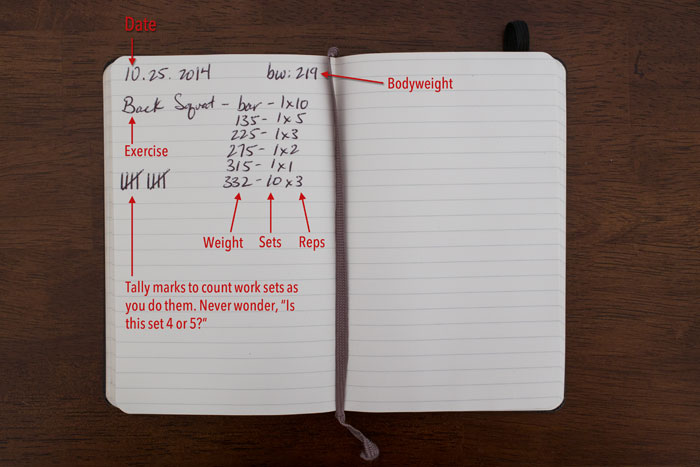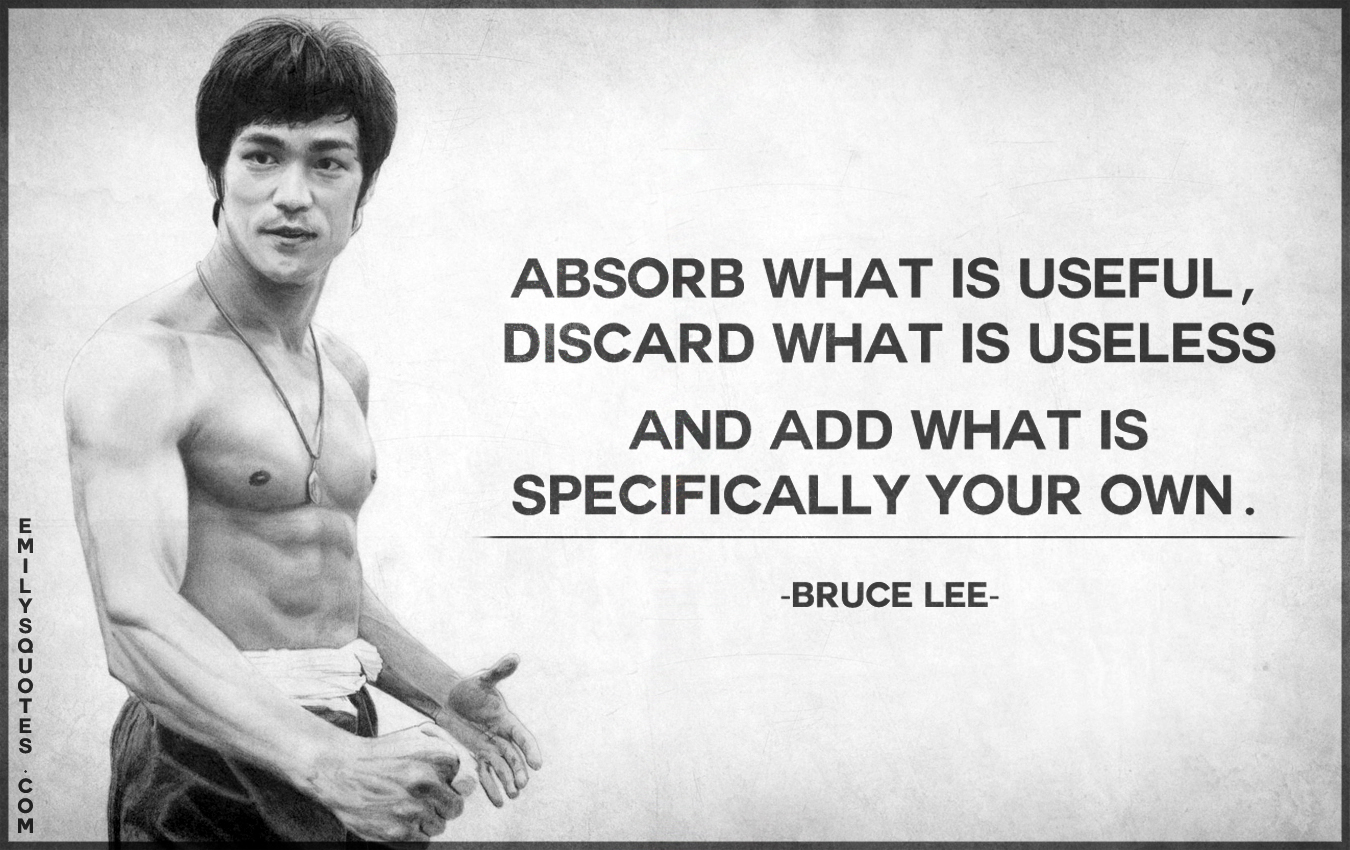I’m a huge fan of cutting things down to the essentials.
“Perfection is achieved not when there is nothing left to add, but when there is nothing left to take away”
If I don’t see a huge benefit that outweighs the cost or potential risk I tend to leave it alone. It’s the reason I don’t advocate or personally use the Olympic style lifts. They are great at building power and speed and have been shown to increase your vertical leap – but for me and my goals and of the people that I train, the potential for injury and the practice necessary to perform these extremely technical lifts is not worth the reward. There are other ways of building power, speed, coordination, and muscle that don’t have the same risks or technical demands that Olympic style lifts have.
Essential Equipment
I don’t use wrist straps because your grip is a great fail-safe that protects you from overloading your body. Chalk should be more than sufficient for regular use. If your gym doesn’t allow chalk, some dry hands and a clean bar are probably enough for most guys. If you can’t hold onto it, you probably shouldn’t lift it. I rarely use a lifting belt for the same reason. If I can’t provide the necessary stability using my own trunk muscles then that lift is probably in excess of what I can handle safely.

I also avoid the use of wrist wraps which stabilize the wrist during pressing movements. If the structure and strength of my wrists can’t handle the weight, I don’t press it. I wait until the structures are built up enough that I can press the weight, pain free. I don’t use pre-workout supplements because
I don’t want to have to rely on stimulants to get psyched up for a workout and I don’t want to be artificially amped up which could mask a lack of recovery or let me push myself past a healthy limit. Although I know a lot of guys get a huge benefit out of music while working out, when I’m “in the zone” I can’t hear the music anyway. You could be 6 inches away screaming in my face and I wouldn’t even notice you when I’m focused. For me, music is just a distraction. I do what I can to pare down what I require at the gym but one piece of equipment that is constantly at my side: my workout journal and a pen.
Lost Knowledge
I’ve been logging workouts in journals for several years. One of my biggest regrets is actually losing the journal I used in college when I prepped for my first power lifting competition. I had not trained at all, no running, no lifting, no exercise for 6 months, when I had heard about the power lifting competition in late August. I started training on September 1st of that year. The competition was November 12th. Within that time I went from a 185lbs max bench to 255lbs, 225lb squat to 365 and a 225lbs max dead lift to 405lbs.
I remember the program I used to get there but I can’t remember the weights that I used along the way. Even I don’t remember the exact number of sets and reps. I can’t recall the assistance moves I used at the time or when I started cutting down my volume. To this day I still wish I had that precious $1.50 notebook.

Since that time, I’ve had, and kept, several notebooks that I flip through from time to time to look for trends. I took notes on when I hit failure, when I was injured and how much progress I made. I keep stats on my measurements and my body weight as well as the actual workouts I performed. If I’m specifically experimenting with tempo like lifting very slowly or with explosiveness I’ll make a note of it in my journal. This information has been invaluable to me and my training and helping me to expand my understanding not only to what I personally respond to but also over arching training principles. These are some of the benefits to using a workout journal.
Black and White Proof
You have concrete proof of your progress over time. You know that you’re lifting more weight than the week before or you increased your volume from last year because you can stare at it on the page. That ink doesn’t lie. Sometimes, and especially when we’re talking about gym lore, numbers can be inflated over many retelling of your proud moments.
Personal one rep maxes slowly inch higher and higher towards state and national level records. The numbers of reps ever so slowly creep into the dozens over time as the story is told and retold. By writing it down, it keeps you honest but also provides hard proof of the work you’ve accomplished.
Be Honest with Yourself
Keeping a notebook keeps you honest with your weights. You can only expect to improve so much from week to week and month to month. By keeping a hard copy of the actual weights and reps you are using it’s not only easier to keep track of where you should be headed but it also keeps your expectations reasonable. By cheating like hell and breaking form on those last 3 reps you should probably not count those as “real reps” because next week your goal is to try to beat your last best.
If you know you’re going to have to do better next week you have less of an incentive to inflate the numbers you record. It forces you to be more modest. If you use your notebook to keep track of your diet or weight you can also be mindful of realistic expectations. Regardless of what you read in the magazines you’re probably not going to put on 50lbs of solid muscle in 6 months. Not without a lot of pharmaceutical help at least.
But an extra 10lbs of solid muscle is a HUGE gain. And if you were to put that on in 6 months or even a year of steady training that is something you can be really proud of. Your notebook will keep you honest and grounded while hopefully providing you with enough reassurance that you’re headed in the right direction.
#Trending
Whether you’re headed in the right direction or not is a tricky question to answer just by how you feel or look in the mirror on any particular day. Your notebook can show you trends over time which is really the most important concept to understand if you’re in this for the long haul. It’s better to work slow and steady and still be in great shape in 10, 20, or 30 years from now than to bust your ass, get injured and give up and turn into a fat old slob.
Not only will your workout journal keep you on the straight and narrow during your lifting career it can also save you from wasting months or even years of your training life. During one phase of strength training for several months trying a new program I had begun to get progressively weaker. I couldn’t understand why weights that I had used 6 months earlier now seemed to be getting heavier and heavier with each workout. Though I was sleeping enough, I was eating enough and I was resting enough between workouts.
Sure my stress levels were a little higher than normal but nothing seemed to be adding up. I was definitely getting weaker as each week passed and even worse – I had no idea why. It wasn’t until I looked at one of my notebooks that I realized working with weights at or above 90% of my one rep max can lead to accommodation and a sort of deconditioning. Weights at that level for weeks on end had had the reverse effect that I wanted. I put in a quick google search and came to the work of Louis Simmons and his theories on power lifting based primarily on the work of the Soviets in their Olympic weight lifting and his own personal experience as a competitive power lifter.
This was the first big epiphany I had about how important keeping a notebook really was. Without being able to go back and physically reread all of my own notes I would never have stumbled upon that pattern. I never would have looked up this phenomenon and I might not have been exposed to one of the most forward thinking strength coaches of our time. That one small act literally changed the course of my training life.
Now Use What You’ve Learned, Grasshopper

Some of the most productive training cycles I’ve had were after I analyzed and reformulated programs that had produced great results for me in the past. Each body part responds to different stimuli to greater and lesser extents. Certain compound lifts will increase in weight or have a more or less profound effect on your physique depending on several variables. Being able to track and correlate these variables for what works best for you will save you a lot of time and headaches in the long run if you track all of these things.
If you don’t put this stuff into practice and make changes to your workouts or lifestyle as a result of the numbers, there’s no point in tracking all of this stuff. Some guys just get a nice dopamine rush from checking their Fitbit to see if they hit their 10,000 steps for the day – and that’s all well and good, especially if you need the motivation to get up and move your ass – but it’s pointless if you find yourself not hitting your goals and then not reflecting on what brought you to this state. Use the data that you’re collecting to make an actionable change. You won’t be sorry.
Memories
Your workout journals can serve simply as something you wished you held on to when you were younger. You’ll be able to show your son(s) or guys that you’re mentoring your progress over time. You can show them that you really did hit that big bench press back in college or in your 30s, or 40s or 50s as the case may be. It’s a testament to the work you’ve put in and where you came from.
Final Thoughts
Weight lifting is hard. That shit is heavy, and your muscles get sore and it makes you tired. There’s the potential for injuries and you develop callouses and you might even puke a couple times in your training life. Is it worth it? For me, weight training is one of the best things I’ve ever done for my mental health, self esteem, dating life, professional life, and my health. It grounds me in a way team sports never could. I feel good when I know I hit a new record EVEN IF the guy next to me just doubled my one rep max in his warm up. Fuck him – I do it for me, not to impress the other guys at the gym.
If you started curling a 10lb dumbbell for 10 reps and 6 months later you’re banging out sets with a 30lb dumbbell that’s something you can be proud of. It’s all too easy to forget how far you’ve come, especially once training has become a regular, habitual part of your life. Use your workout journal to support these efforts. Look back on it from time to time to reminisce on how your life has changed inside and outside of the gym.
